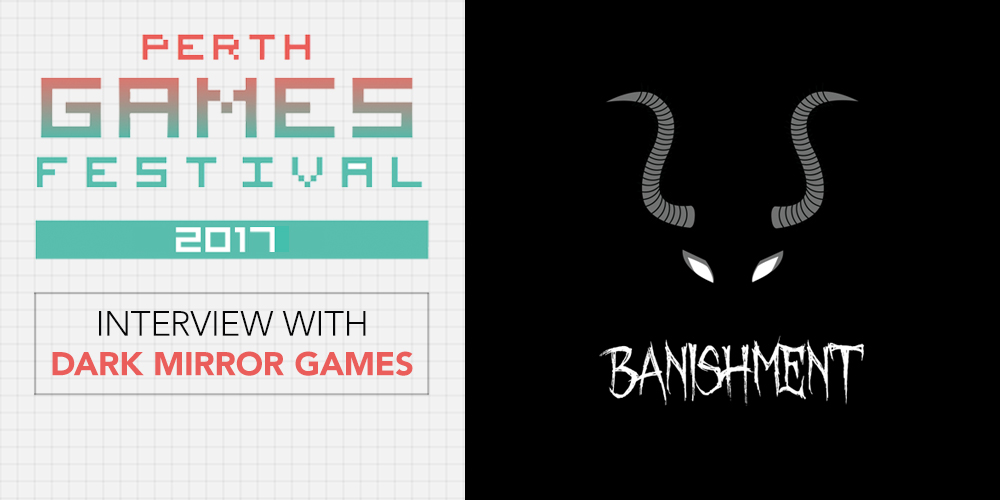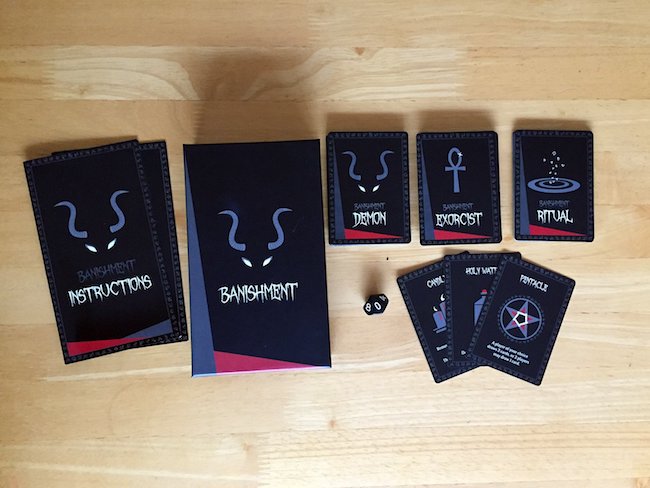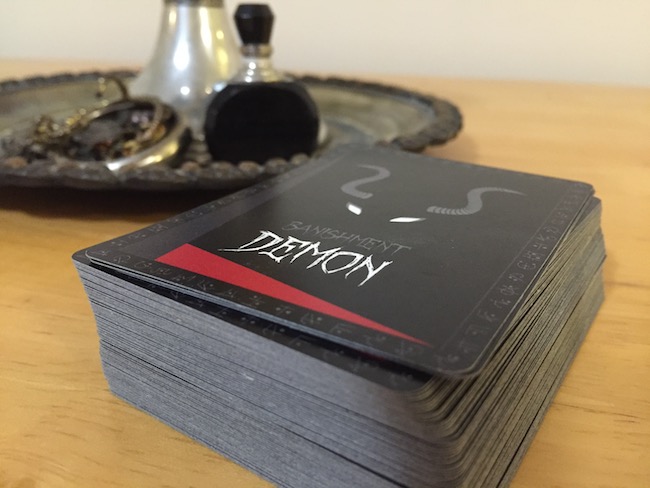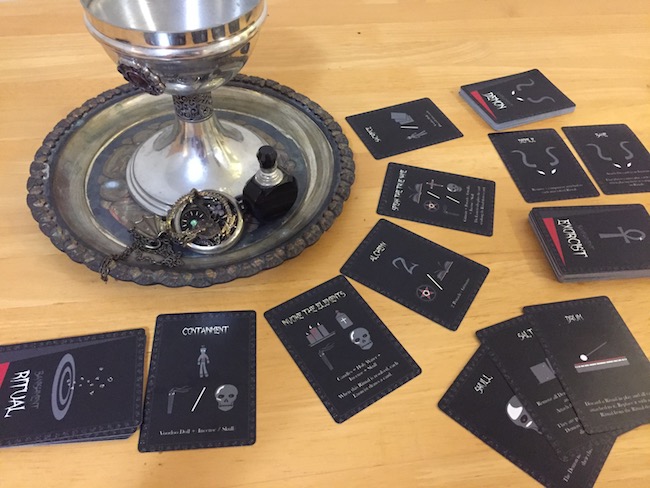
I’ve always had a soft spot for self-contained card games; they’re conducive to a positive social atmosphere and are a great piece to bring out at gatherings where you can learn a bit more about each other and hopefully have some quality fun together too. To this end, I was thoroughly impressed when I played through a couple rounds of Banishment with creators, Kim and Jonathan of Dark Mirror Games. Designed as an asymmetrical semi-cooperative experience, Banishment sees a powerful demon beset against a team (between 2 and 4) of exorcists who are trying to expel the demon back to his hellish domain by completing a number of tasks itemised on the game board. Should the timer run out, the demon wins and claims all souls at the table. For such a straightforward premise, the game delivers an extraordinarily enjoyable and memorable experience, coupling a low entry barrier with a gradual increase in complexity that never feels too fast paced or game-breaking.
Banishment had a great showing at PGF last year, so what’s been happening since then?
Kim: Last year we were demoing our prototypes and were encouraged to go ahead and Kickstart Banishment from the positive feedback it received. It ended up exceeding its original funding goal by 400%. We’d originally only planned for a small print run, but thanks to the campaign success were able to add an expansion and expand the number of copies printed. We launched Banishment officially in August and now have it available for sale!
Jonathan: We also took Banishment to PAX Australia to get some exposure over east.
What were some of the challenges you faced when designing Banishment?
Kim: We were happy with the main game mechanics right off the bat, but we discovered quite a few issues with specific card combos and interactions during testing, and it took us many iterations to iron those out. Often it was as simple as changing or adding a single word to clarify or restrict a function, but it made a big difference to usability.
Jonathan: We also butted heads a few times over the creative direction as our opinions didn’t always align. We always worked it out in the end, but each of us had to make a few compromises. I think we’ve agreed one of us should take point on future projects to cut down on the number of arguments.
Kim: Lastly, because the Kickstarter did so well, we had to go back and change our production model and adjust for it in the designs, which meant completely redesigning the packaging, revisiting our future plans for the game, and a few other things we hadn’t originally planned to adjust.

Did feedback from last year’s PGF or local playtests influence the game’s design at all?
Kim: It certainly did! PGF was fantastic for testing as we had access to a wide variety of people to test Banishment in a short time period. We kept a file of notes and feedback from playtesters at PGF and went through it soon afterwards. It helped us smooth out several issues with wording and specific interactions. I think there were even a couple of card suggestions put to us at PGF which made it into the Cult War expansion.
We also made use of Game Foundry testing nights at Good Games to draw on local developer knowledge and organised our own testing nights with friends. All of these events helped us identify areas for improvement.
Jonathan: When you have an asymmetrical game, you want to see as many iterations as possible to ensure both sides are balanced against each other. PGF was a perfect opportunity to do this.
What is your favourite feature of Banishment?
Jonathan: I really like the flavour of the game. We had a lot of fun coming up with card names and tried to inject the same sense of fun and personality into Kickstarter campaign by doing all of our updates in character.
Kim: Coming up with a strategy out of randomness. Almost all my favourite games involve some variant of this, and I never get tired of playing Banishment with people. I also like its fast pace. You don’t get bored waiting for someone to take their turn.
Why did you choose tabletop gaming instead of electronic as your medium?
Kim: Neither of us are programmers or knew someone who would be willing to program for us, and we enjoy tabletop games. It was the logical decision because of that.
Jonathan: Electronic games are often a solitary pursuit for me. Tabletop games are always social, so when you’re gathering people together to test, it appeals more to me to have a tabletop game.

Who are your main inspirations when designing games?
Kim: I confess I’m pretty ignorant of the big names in game design. I could point you to influences from games or works of fiction, but probably not the specific designers. For example, Banishment was influenced in part by Magic: the Gathering, which we both play a lot of, as well as co-operative games and party games. Keep Talking and No One Explodes was one of the initial primary influences in that we wanted to make an asymmetrical game people could play at parties. More broadly, we both have similar tastes in surrealism, fantasy and elegant storytelling, and I think that tends to come through in what we produce.
Jonathan: I often compare it to Betrayal at the House on the Hill after the haunt has been revealed
Who is the artist behind the visual designs of Banishment, and how did you come to meet them?
Kim: This was me, although I don’t tend to think of myself as an artist. Jonathan and I met at a party when I asked him to be in my band. I needed a drummer. Instead, I found a husband and business partner (as well as an excellent drummer).
Jonathan: She’s very modest, but she’s an excellent designer and the most creative person I know.
How did you and Kim come to work together and synergise your influences into Banishment?
Kim: We have an insane number of things in common. An almost identical set of hobbies, as well as very similar tastes in games, music, books and just about any creative medium. Before we met, we each worked on many of our own creative projects, and it just made sense to start working on some together.
Jonathan: We made Banishment for the 2016 Global Game Jam, which we did for fun, but it was only after showing the game to others that we thought it might be worth Kickstarting.

What are some memorable moments from the development cycle of Banishment?
Jonathan: When we made the first iteration of the game during the Global Game Jam, so we found ourselves trying to get the cards printed and cut at an Officeworks only a few hours before the submission deadline!
Kim: The Perth Games Festival is right at the top! I think it was the first time either of us realised people other than our friends might actually like it. Conducting the Kickstarter campaign was certainly also up there because it’s an unusual and surreal type of experience.
The game is officially released now, so what can we expect from Dark Mirror Games in the future?
Kim: We’re currently Kickstarting a new game – the Draft Banquet – which uses card drafting to gamify social cooking. It’s at a late prototype stage, so if it succeeds, we’ll go ahead with production in early 2018. Otherwise, I’m working on a strategic board game about rescuing uncooperative cats during a zombie apocalypse.
Jonathan: I’m working on an RPG system based around card drafting, but I don’t feel the need to rush that one. I love card drafting and deck building mechanics so also playing around with those ideas while trying to do something that hasn’t already been covered by games like Dominion or Seven Wonders.
If you’d like to keep up to date with what Dark Mirror Games are working on, you can follow them here:
Website: https://darkmirrorgames.com/
Facebook: https://www.facebook.com/darkmirrorgames/
Twitter: https://twitter.com/DarkMirrorGames











